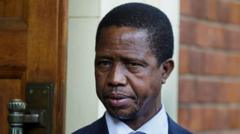Iran recently observed a state funeral for approximately 60 individuals, including high-ranking military officials and nuclear scientists, who perished in the recent conflict with Israel. Public response showcases deep national mourning, while geopolitical tensions remain heightened, particularly with remarks from US President Trump regarding future military actions against Iran.**
Grieving Iran Holds Somber State Funeral for Slain Military Leaders in Wake of Conflict with Israel**

Grieving Iran Holds Somber State Funeral for Slain Military Leaders in Wake of Conflict with Israel**
Tensions rise as Iran mourns the loss of key military figures amid fallout from its recent conflict with Israel, while international responses add to the unrest.**
A state funeral was held in Iran for nearly 60 individuals, including military leaders and nuclear scientists, who tragically lost their lives during a 12-day conflict with Israel. The ceremony took place near Tehran's Enghelab Square, witnessing massive crowds donning black attire, chanting in mourning, and displaying portraits of the deceased, all while coffins draped in the Iranian flag were prominently showcased. The conflict concluded with a ceasefire earlier this week, notably impacted by airstrikes on critical Iranian nuclear sites initiated by US forces.
Among those honored was Mohammad Bagheri, the chief of staff of Iran's armed forces, who was buried alongside his wife and daughter, victims of an Israeli strike. Iranian officials report that 627 lives were taken during the conflict, while Israeli authorities claim 28 people died in their territory due to missile strikes attributed to Iran. High-profile attendees, including President Masoud Pezeshkian and military leader Rear Admiral Ali Shamkhani—who himself was injured in an Israeli attack—were present at the solemn gathering.
The context of this funeral coincides with escalating tensions between Iran and the US, particularly in light of President Trump's recent statements suggesting he would not rule out further military action against Iran if its nuclear ambitions appeared to pose a threat. Trump, in a White House briefing, criticized Iranian leadership, underscoring a lack of faith in claims of Iranian victory over Israel.
In a contrasting tone, Iranian Foreign Minister Abbas Araghchi condemned Trump’s remarks, urging the US President to adopt a more respectful approach toward Khamenei in pursuit of diplomatic negotiations, as he asserted that the recent Israeli offensive had not significantly diminished Iran's nuclear capabilities. Meanwhile, the head of the International Atomic Energy Agency (IAEA) emphasized that military strikes cannot effectively solve the dilemma of nuclear armament and that diplomatic agreements are essential.
Despite the somber atmosphere, Tehran displays signs of life returning to normalcy as residents grapple with the trauma of the recent conflict and international tensions remain high. The mourning showcased at the state funeral reflects a collective grief not only for the fallen but also for the rise in hostilities that lie ahead on the geopolitical stage.




















